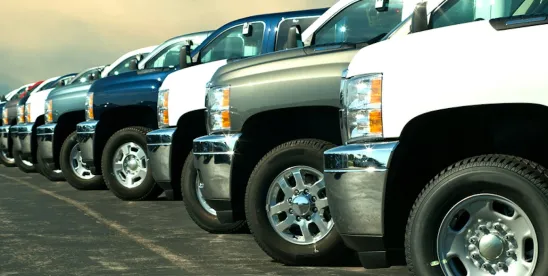Recent Congressional and Executive Branch actions have been met with fast-moving litigation, upending the regulatory framework governing emissions standards for heavy-duty vehicles and engines.[1] In June 2025, Congress—invoking the rarely used Congressional Review Act (CRA)—passed, and President Trump signed, three joint resolutions disapproving EPA waivers that had allowed the California Air Resources Board (CARB) to enforce the following regulations:
- Advanced Clean Trucks (ACT);
- Advanced Clean Cars II (ACC II); and
- “Omnibus” Low-NOx.
The CRA resolutions purport to void the waivers “as if they had never taken effect,” raising immediate questions about the continued enforceability of state-level standards that manufacturers have been preparing to meet for model year 2026 and beyond. Multiple lawsuits involving California (and “Section 177” states) and the Trump Administration have been filed, with the U.S. Department of Justice (“U.S. DOJ”) litigating in federal court to bar CARB from enforcing the preempted rules. Manufacturers—caught in the crossfire—face conflicting federal and state directives, potential civil penalties, and significant certification risk.
Below we summarize the dynamic legal, political, and enforcement landscape and outline practical considerations for heavy-duty vehicle and engine manufacturers navigating this period of extraordinary regulatory uncertainty.
Background: From Waivers to CRA Rescission
- EPA Waivers (2023–2025). Between April 2023 and January 2025, EPA granted three Clean Air Act § 209(b) waivers authorizing CARB to enforce the ACT, ACC II, and Omnibus regulations. The waivers also enabled Section 177 states to adopt identical standards.
- Trump EPA Submission. On February 14, 2025, the incoming EPA leadership transmitted the waiver notices to Congress as “final rules,” paving the way for CRA resolutions.
- Congressional & Presidential Action. The House and Senate adopted H.J. Res. 87-89 after first voting to overturn the Parliamentarian’s ruling that the CRA did not apply to waivers. President Trump signed the resolutions on June 12, 2025.
The Clean Truck Partnership
In July 2023, CARB and major heavy-duty truck and engine manufacturers entered into the Clean Truck Partnership, an agreement intended to provide manufacturers with additional compliance flexibility in exchange for commitments to meet California’s emissions standards—including the ACT, Omnibus, and Advanced Clean Fleets rules—regardless of the outcome of litigation or changes in federal law. The Partnership was designed to harmonize state and federal requirements and to address industry concerns about lead time and technical feasibility. The Partnership also restricts manufacturers’ ability to challenge California’s regulations or support legal challenges in other states, further complicating risk management and advocacy strategies.
However, following the CRA’s revocation of the underlying EPA waivers, the Clean Truck Partnership—and CARB’s subsequent regulatory actions—have become central issues in ongoing litigation. The U.S. DOJ and several trade associations allege that the Partnership is an unlawful mechanism for enforcing preempted state standards, imposing regulatory obligations on manufacturers even in the absence of valid federal authorization.
In August 2025, the U.S. DOJ issued a cease-and-desist letter to major Original Equipment Manufacturers (OEMs), explicitly directing them to immediately cease compliance with both the Clean Truck Partnership and CARB's preempted state vehicle emission regulations. This federal directive stands in direct conflict with CARB's position, as the agency asserts that the waivers and the regulations remain valid.[2]
Litigation Landscape
| Case | Key Allegations |
| N.D. Cal.: California et al. v. United States | California argues that the CRA does not apply to EPA waiver decisions, and that Congress's resolutions are unconstitutional, violating separation of powers and federalism. California seeks a declaration that its waivers remain valid and enforceable, and that the state retains authority to implement its emissions standards. |
| N.D. Ill.: American Free Enterprise Chamber of Commerce v. Engine Manufacturers Association; DOJ Intervention | The American Free Enterprise Chamber of Commerce alleges that the Clean Truck Partnership constitutes an unlawful attempt to enforce state emissions standards that are preempted by federal law, and that they have anticompetitive effects. The DOJ, intervening, argues that CARB's continued enforcement of the ACC II, ACT, Omnibus, and Clean Truck Partnership is preempted by the Clean Air Act following the CRA resolutions, and seeks to enjoin CARB from enforcing these standards and directives. |
| E.D. Cal.: Daimler Truck NA et al. v. CARB; DOJ Intervention | OEMs seek declaratory and injunctive relief, arguing that they are caught between conflicting federal and state directives: DOJ cease-and-desist letters prohibit compliance with CARB's preempted standards, while CARB insists its regulations remain enforceable. Plaintiffs specifically challenge the enforceability of the Clean Truck Partnership. DOJ supports the OEMs' position that CARB's standards are preempted and unenforceable. |
Potential Congressional Investigations
Meanwhile, the House Energy & Commerce Committee has launched oversight inquiries into CARB’s ongoing enforcement activities and communications with Section 177 states. Congressional committees could seek related materials from manufacturers as well.
Implications for Heavy-Duty Manufacturers
Near-Term Outlook
- Certification Risk for MY 2026+. CARB staff, in a May 2025 advisory document, have stated they will continue to accept and process applications for model year 2026 Executive Orders under the requirements of the ACC II, ACT, and Omnibus regulations[3]—even though the U.S. DOJ has issued a cease-and-desist letter instructing manufacturers to cease compliance as the regulations are preempted by federal law. A subsequent CARB advisory allows manufacturers to obtain California certification during the pendency of the litigation by:
- Complying with the CARB regulations covered by the revoked waivers;
- For manufacturers who are party to the Clean Truck Plan, complying with the terms of the agreement;
- Complying with preceding CARB regulations (i.e., the regulations in place prior to those revoked under the CRA); or
- Complying with current EPA regulations.
Importantly, CARB has reserved the right to revoke certification obtained under the last two options if the CRA resolutions are invalidated.
- Enforcement Exposure. Under California law, CARB retains authority to assess civil penalties for sales without a state Executive Order, while DOJ seeks injunctions and potential federal enforcement for adherence to preempted standards or the Clean Truck Partnership. Risk assessments must account for both avenues.
- Litigation: Briefing in the California and DOJ suits will proceed this fall. EPA could issue additional guidance on certification during litigation, but timing is uncertain.[4]
- Congressional Investigation: Congressional committees may issue additional document requests and conduct hearings.
Long-Term Outlook
- Unfavorable Treatment in California. California Governor Gavin Newsom issued an Executive Order directing CARB to continue pursuing the objectives of the ACC II, ACT,[5] Omnibus, and Advanced Clean Fleets rules, as well as the Clean Truck Partnership, regardless of the status of those regulations under federal law. The Executive Order further instructs CARB to prioritize manufacturers who certify compliance with these standards in state procurement and funding decisions, and to identify additional opportunities for special consideration in future regulations.
- State-by-State Patchwork. At least ten “Section 177” states have adopted or are considering adopting California’s federally abrogated heavy-duty rules. Without valid waivers, these states arguably lack authority to enforce the rules, but no uniform guidance has been issued, and state regulators may take divergent positions.
- Litigation: Final appellate decisions will shape whether CARB retains a pathway to new waivers or whether Congress’ use of the CRA here sets precedent for future state programs. Legislative or negotiated settlements remain possible but unpredictable.
Footnotes
[1] A separate alert is forthcoming covering recent developments affecting the light-duty vehicle sector.
[2] The FTC recently concluded an antitrust investigation into the Clean Truck Partnership and related voluntary emission agreements, reaching a settlement in August 2025 that bars major truck manufacturers from entering such deals with California. This outcome adds complexity to the regulatory landscape, as manufacturers now face both conflicting state and federal requirements and increased antitrust scrutiny over alleged emissions-related collaboration.
[3] CARB, Manufacturers Advisory Correspondence (MAC) ECCD-2025-03. This MAC is no longer available on CARB’s website.
[4] Plaintiffs in the Daimler case have informed the court that they are seeking an agreement with California to allow the sale of affected vehicles and engines without requiring certification during litigation.
[5] Notably, CARB approved amendments to the ACT in late July 2025 despite recent federal action and pending litigation.







 />i
/>i
